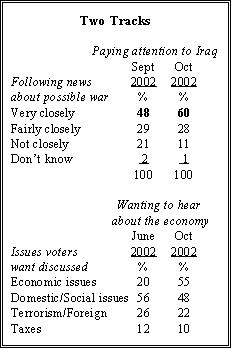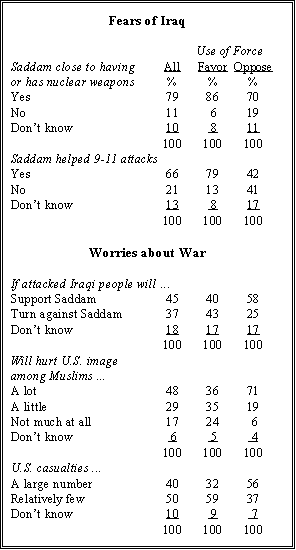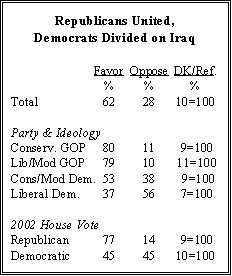Introduction and Summary
A possible war with Iraq is an increasing concern of the American public. It has emerged as the national issue that people discuss most often with family and friends, and news interest in the Iraq debate rose dramatically in September. But as the midterm elections approach, it is the economy and other domestic issues - not Iraq or terrorism - that voters most want to hear about in their states and districts.

The latest Pew Research Center survey of 1,513 Americans, conducted Oct. 2-6, shows that six-in-ten Americans are following the debate over possible military action against Iraq very closely – up from 48% in September – making it the year’s top news story. Roughly half (52%) say the subject of a possible war with Iraq comes up frequently in conversation, somewhat more than the proportion who mention the economy, the threat of new terrorist attacks, or other issues.
Yet the increasing national focus on a confrontation with Iraq is having no discernible impact on the battle for Congress, which remains deadlocked with less than a month to go. And when thinking about the midterm election the economy, by far, tops the voters’ agenda. Asked in an open-ended format which single issue they would most like the candidates to discuss, fully 55% mentioned the economy or economic issues. By contrast, just 22% cited terrorism/foreign policy issues including references to “war” or “Iraq,” which were named specifically by just 7%. This is the second survey this year finding that, on an unprompted basis, voters express much more interest in hearing from candidates about domestic concerns than the war on terrorism or foreign policy issues.
The race for control of Congress remains stuck in a statistical dead heat. This is the third time since June that Democrats have held a slight 46%-44% lead over Republicans. The parties’ images also have shown little change, with Republicans holding a substantial edge on Iraq and terrorism. For the first time this year, Democrats are favored on the economy, but only slightly (41%-37%).
There has been some movement in President Bush’s ratings over the past few months. The current poll, conducted before Bush’s Oct. 7 speech on Iraq, shows the president’s overall job performance rating once again dipping to the low 60’s (to 61% from 67% in mid-September). Fully seven-in-ten continue to approve of the president’s handling of the war on terrorism while a solid majority (56%) gives him a positive rating on Iraq. Roughly half (49%) approve of the president’s performance on the economy, down from 53% in June. There remains, however, little correspondence between changes in the president’s approval ratings and the congressional horse race.
The public is more bearish about an economic recovery than at the beginning of the year. Today, just 34% expect that economic conditions will improve over the course of the next year, well below the 44% who held that opinion in January. Assessments of the stock market are about the same as in January, with slightly more than a third (36%) expecting the market to go up over the next year. Investors are somewhat more bullish than non-investors about the market; 43% of those with 401k accounts or other market investments expect the market to gain ground, compared with 25% of those who do not have investments.

Clearly, the president’s major arguments in favor of taking military action against Iraq are resonating with the public. Eight-in-ten Americans believe Iraq already possesses nuclear weapons or could soon obtain them. Two-thirds think Saddam had a hand in the Sept. 11 terrorist attacks. And by an overwhelming margin (85%-8%), the public believes that in order to deal with the threat posed by Iraq, Saddam must be removed rather than disarmed and allowed to remain in power.
There is much less unanimity over the possible costs and consequences of a war with Iraq. Nearly half (48%) are concerned that the conflict would do a lot of damage to the U.S. image among Muslim nations, and a 45% plurality expects that if there is a conflict most Iraqis will end up supporting Saddam. As with any deployment of U.S. forces, casualties are a concern: 50% expect relatively light U.S. losses, while 40% say there will be a large number of American casualties.
Perhaps not surprisingly, supporters and opponents of military action have dramatically different perceptions of how a conflict with Iraq would unfold. The biggest differences come over whether a first strike against Iraq would embolden other nations to follow suit in future wars and whether traditional U.S. allies will join us in this one. Further analysis finds that seeing a war with Iraq as part of the struggle against terrorism has the most powerful impact of the perceptions tested on backing military action.
To a surprising degree, both supporters and opponents of military action agree on the threat posed by Iraq: Fully seven-in-ten war opponents believe Saddam either possesses nuclear weapons already or will soon do so, and 66% of this group believes that in order to address the Iraqi threat Saddam must be removed, not just disarmed.

Overall, the public remains supportive of military action to achieve Saddam’s ouster. Roughly six-in-ten (62%) currently favor military action against Iraq, little change from September and August. The public is deeply split along partisan and ideological lines on this issue. Republicans, both conservative and moderates, favor military action by roughly eight-to-one. A thin majority of conservative and moderate Democrats also back the use of force against Iraq, but liberal Democrats oppose military action (56%-37%).
And while relatively little discussion has occurred about the aftermath of a possible war, a solid majority of the public (60%) favors a major U.S. effort to rebuild Iraq and establish a stable government there after the war. About a third (32%) would oppose this. Majorities of both supporters and opponents of military action favor the effort to rebuild Iraq.




